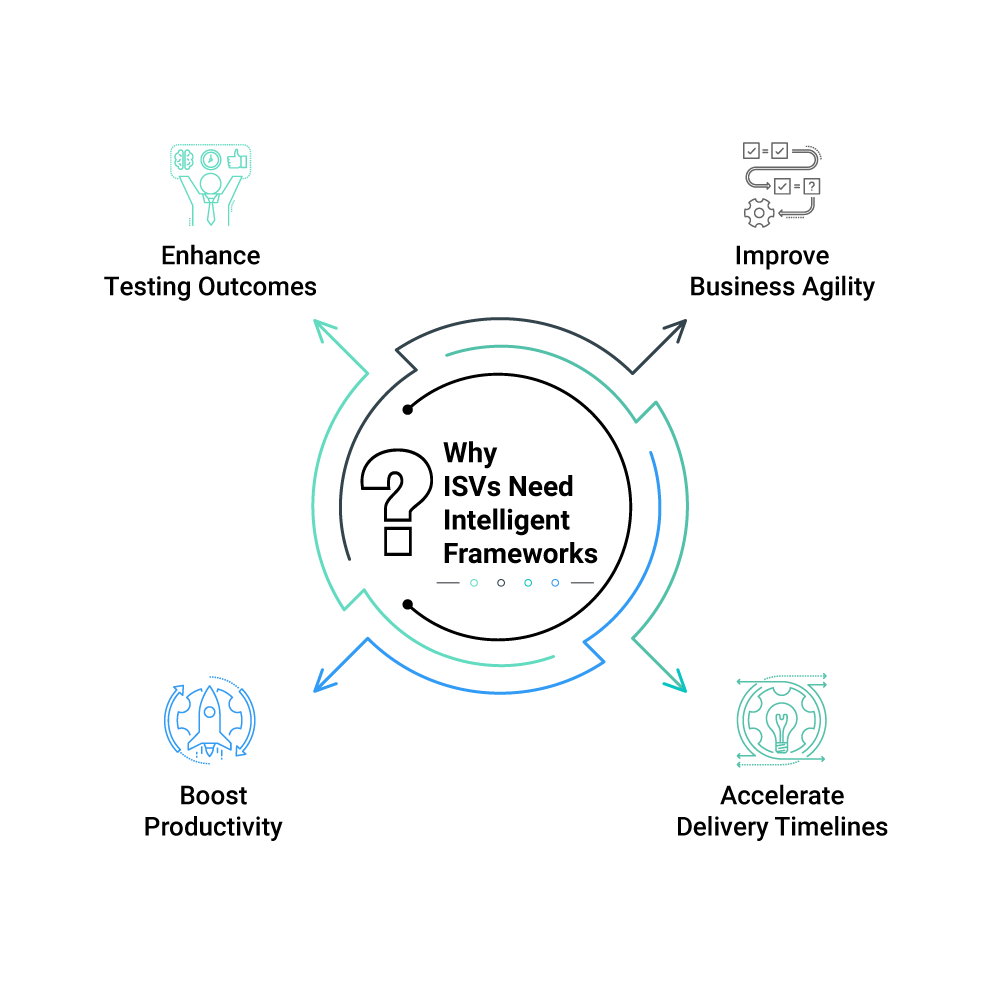



According to the Accelerate State of DevOps 2021 report, the research continues to show that excellence in software delivery and operational performance drives organizational performance in technological transformations. Engineering teams with elite performers are decreasing their lead times for changes to production. The industry continues to accelerate, and teams see meaningful benefits from doing so.
In today’s digital economy, every business needs to chart a path to achieve the next level of growth.
With CIOs and technology VPs facing growing demands to scale digital platforms, teams are constantly under pressure to build new-age solutions from scratch or leverage existing applications. The aim is to transact business faster, manage processes, facilitate global collaboration, and monitor and report on the status of the business and its performance. But this pressure can only be met when ISVs adopt the right frameworks and leverage them to accelerate their software engineering outcomes.
Why ISVs Need Intelligent Frameworks?

Today’s customer-centric era presents unlimited and unparalleled opportunities for independent software, systems, and appliances vendors. However, with so many new pressures and requirements hitting teams almost daily, there’s little time to engage in “what ifs” to drive innovation.
Instead of loading your in-house talent with complex and time-consuming tasks, supplying them with intelligent frameworks and modern automation tools is a great path towards accelerated software engineering - especially when it comes to maintenance and testing. Here are some compelling reasons why ISVs need intelligent frameworks:
- Enhance testing outcomes and ensure the products that are delivered to users meet the required quality, security, and compliance requirements.
- Improve business agility via automation and easily respond to changes in customer needs, market dynamics, and business environment.
- Boost productivity by providing teams with the tools, processes, and insights they need to do their jobs quickly and efficiently.
- Accelerate delivery timelines by getting timely insight into bottlenecks and taking actions on them for quicker resolution.
Six Areas ISVs Must Focus on For Accelerated Software Engineering
If you want to develop products that work seamlessly with modern technologies, customer infrastructures, and third-party software, you need to embrace intelligent frameworks and drive the required level of efficiency, agility, and profitability across integrated value chains and ecosystems. Here are six areas in which ISVs must adopt intelligent frameworks for accelerated software engineering:
SDLC: If you want to boost performance insights and reduce risks, one of the first areas to focus on is the modern software development lifecycle. Embracing a tech-agnostic automation framework that streamlines different stages of the SDLC is a great way to accelerate software engineering. For instance, teams can use intelligent frameworks to automate coding, improve testing outcomes, and ensure bugs are rectified quickly and efficiently. The right framework can not only simplify testing and enable faster code reviews; it can also deliver timely recommendations, strengthen governance, and efficiently track and maintain engineering metrics across the stack. What’s more, the right framework can also help enhance developer skills and boost engineering productivity, while ensuring quality improvements and reduced software development costs.
- Operations Monitoring: Another aspect of software engineering that needs continuous monitoring is operations. Therefore, adopting an intelligent framework with monitoring, alerting, and self-healing capabilities can deliver real-time insight into the efficiency of processes. By constantly monitoring server, application URL, and database health across on-premises and cloud platforms, an operations monitoring framework can identify challenges and bottlenecks in time alert the appropriate team for resolution.
- Real-Time Dashboards: Real-time dashboards for applications and infrastructure monitoring can additionally uncover much-needed insight into tool, project, and individual performance while also providing reports on error logs, alert history, and more.
- Quality Assurance: In software development, QA takes up a lot of precious software engineering time. Embracing automation frameworks in the QA process that are built for web, mobile, desktop, and API applications can aid in accelerating automation and integration across various tools and systems. Such automation can not only help in early issue identification; it can also deliver the required level of transparency and improve test coverage. At the same time, the framework can help in enhancing productivity (and time savings), increasing the quality of testing, ensuring continuous governance across the SDLC – and eventually accelerating time-to-market.
- Cloud: With most customers now expecting software products to deliver cloud-related capabilities, engineering teams are under immense pressure to embrace the cloud in their day-to-day processes. But adopting the cloud is not as simple as flipping a switch. It requires thorough planning, and intelligent frameworks can aid in making this process quick and interruption-free. Frameworks across cloud readiness assessment, data and analytics, DevOps, cloud security, and cloud infrastructure can support the development, integration, and testing of cloud features and capabilities into the DNA of your software product while enabling specialized testing to detect app crashes, memory leakage, and security issues.
- System Performance: Embracing intelligent frameworks and automation tools that are built for API and web applications performance testing can also help in streamlining and accelerating the software engineering process. With the ability to easily set up performance tests and extract system resources like CPU, Memory, Disk, etc. from database servers, such frameworks can pave the way for distributed testing as well as for alteration of test configuration parameters – without altering the underlying code, thus saving teams a lot of time and effort. By presenting teams with various reporting formats that highlight improvement/degradation comparisons with baseline numbers, such system performance frameworks can help in intelligent analysis of test results and ensure your web or mobile application is working to its maximum capacity.
Staying at the forefront of technology innovations while winning the war on scalability, security, performance, and usability is often a Herculean task. But it can surely be made easy by embracing advanced engineering frameworks that automate mundane activities, monitor operations and performance, and uncover bugs and issues in time. By enabling speed and agility in everything you do, these frameworks can help in modernizing your processes, deliver the capabilities your customers expect, and win in the digital marketplace.



 View Previous Blog
View Previous Blog





